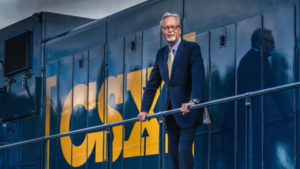First cherries en route on new railcars
Written by jroodA train with refrigerated railcars is carrying its first load of Washington cherries to Chicago this summer, thanks to a new central Washington rail facility built to provide faster delivery of perishable products to the Midwest, the Associated Press reports.
Backers say the new rail service can cover 2,000 miles in less than
four days, far faster and cheaper than standard truck service and
reducing the carbon footprint of each container shipped by 50 percent.
State,
federal and local dollars paid for the roughly $6 million facility,
which has the capacity to ship 200 containers per month. First
shipments, largely apples, started in April, and the first containers of
cherries were shipped last week.
Gov. Chris Gregoire visited the
facility Monday.
The test run of cherries should prove the service
is ideal for shipping the perishable products to Chicago quickly and
efficiently, said Steven Lawson of Cold Train Inc., which operates the
service under its parent company, Rail Logistics.
Temperatures in
the refrigerated rail cars can be controlled remotely and tracked
through shipment.
Empty railcars in Chicago are returning mostly
with meat – chicken, beef and pork – intended for export to the Far
East.
Columbia Colstor Inc., one of the largest cold storage
companies in the country, built a 220,000 square foot facility next to
the rail yard for $25 million. The company stores meat from the Midwest
there upon arrival, then ships it with frozen french fries from central
Washington’s Columbia River basin for export.
The company already
handles 900 million pounds of potatoes each year, all for export to
China, Japan, Korea and Taiwan.
Local officials now are pushing
for improved rail service west to Seattle to export local products more
quickly to the Far East.
Central Washington growers and packers
have long complained about a shortage of rail service west, because
trains arrive to the area already full and must shorten to go through
the Cascades.
"If you can generate the businesses to support it,
it will happen," said Patric F. Connelly, Port of Quincy commissioner.
"But this is a huge step."





